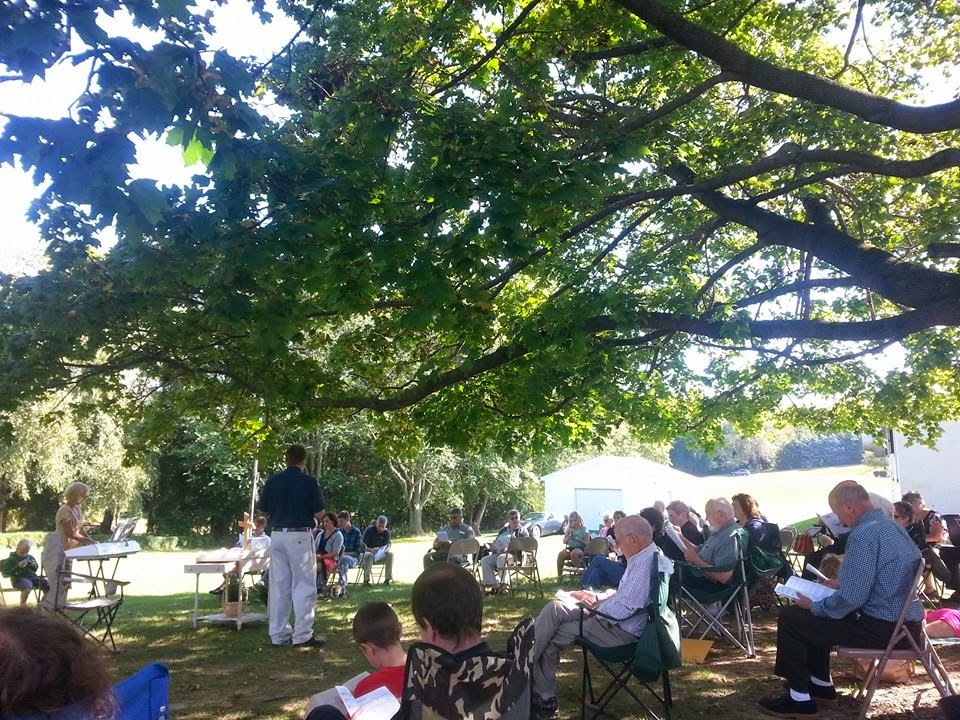Scripture texts: Ezekiel 37:1-19, John 19:16-30, Revelation 21:1-6
Fear. Terror. Horror. Death. Decay. Destruction. These are the themes of Halloween as we have come to understand them. It is a day of monsters and fright. A day of the spooky and macabre, the grim and the sorrowful.
It is good that we are here.
It is good because our society as it has evolved is of many minds about these festivities. Many Christians reject this holiday and its ghoulish traditions as signs of the demonic and the devilish. They believe the devil stalks the Earth on this night more than any other and to name him is to give him power. But that’s not how it works. If you fear a thing, THAT is when you give it power. To name it and claim it, you instead gain power over it.
As much as the Church struggles with how to understand Halloween, so too does our larger society. Halloween is, in many ways, society’s nervous laugh at the darker truths of reality. Nervous because, like much of the church, it fears those darker truths. It refuses to name death and decay, disease and misery, fearing that naming them will draw their attention towards us. But that is not how it works. In fearing them, we give them power. Power they neither merit nor deserve.
Tonight, we are gathered here to name those darker truths, to lay hold of them, and to gain mastery over them. We are here tonight to turn that nervous laughter to confident mirth. We are here to celebrate the core truth of this day that is often forgotten and ignored.
We are here to remember that death has no power over us. That death has been defeated.
That is what all this is about. What it is really about. All our modern Halloween traditions had their origins in the ancient church’s understanding of truth. They would gather on the night of the ancient pagan festivals of autumn and declare to death itself “You have no power here.”
The costumes we wear? The ancients wore likewise, saying to death “You think you’re scary. Let me show you what scary really is.” The grim imagery and frightening themes? Hah, the ancients used these to laugh at death, to make mockery of it, as do we.
We do not fear you, death. We can do scary better than you.
I remember another ancient truth. One I was told once and it has stuck with me throughout my life. The opposite of death is not life; the opposite of death is birth. Our lives hold to a pattern. Birth to death and then, in our faith, we trust and believe in a third step: rebirth or, as we Christians call it, resurrection.
Birth to death to resurrection. Our worship tonight follows that pattern. The Scriptures themselves follow that pattern. Our lives follow that pattern.
We begin with birth. We are born into a broken and fallen world, a world of pain and sorrow, sin and despair. A world that beats us down and does its best to drive out hope and joy from our lives. Oh, Lord, let these dry bones dance! Ezekiel’s vision becomes our prayer. Restore us. Give us back, O Lord, what the world has taken from us.
That prayer has not gone unheard. God has given his answer. God has given himself as answer, born of a virgin, incarnate as Jesus. He came into this world of brokenness and despair and he lived as we live. Learned and saw first hand the troubles and torments of life here on Earth. And, at the end, he gave God’s answer to this fallen world by dying upon a cross and rising again on the third day. “It is finished!” Christ declared from that cross and with those words, death saw its power vanish.
It’s all over but the crying.
John’s vision in Revelation reveals that to us. Because of Christ and his cross, because of Christ and his empty tomb, there will come a day when death will be no more. The powers of evil that we mock this day will see their final defeat. The dragon and the beast, all the monsters of this world both real and metaphorical, will see their end come at last: disease, sorrow, pain, hunger, poverty, war, bigotry, hate, and death all swept away in the glorious rebirth of the world.
Birth to death to resurrection. The cycle will come to its fulfillment through Christ.
Birth to death to resurrection. Death and evil cannot stop it. It is already won. It is finished.
We know this. We trust this. We believe this.
And thus, tonight we gather. We gather pretending to be werewolves and zombies. We gather pretending to be Pokemon and Ninja Turtles. We gather pretending to be fantastical creatures or popular icons of culture and we gather in the midst of darkness and blood because we know these things have no power. We name them and declare the truth about them. They are impotent. Powerless. They bear no threat. They are nothing compared to what Christ has done on his cross.
So let us laugh and have fun on this and every Halloween. Death is powerless. Evil has been defeated. Let us make mockery of their futile attempts to frighten us and drive us to despair. God has answered our deepest prayer. Our dry bones dance. Life is ours through the cross and empty tomb. Amen.








